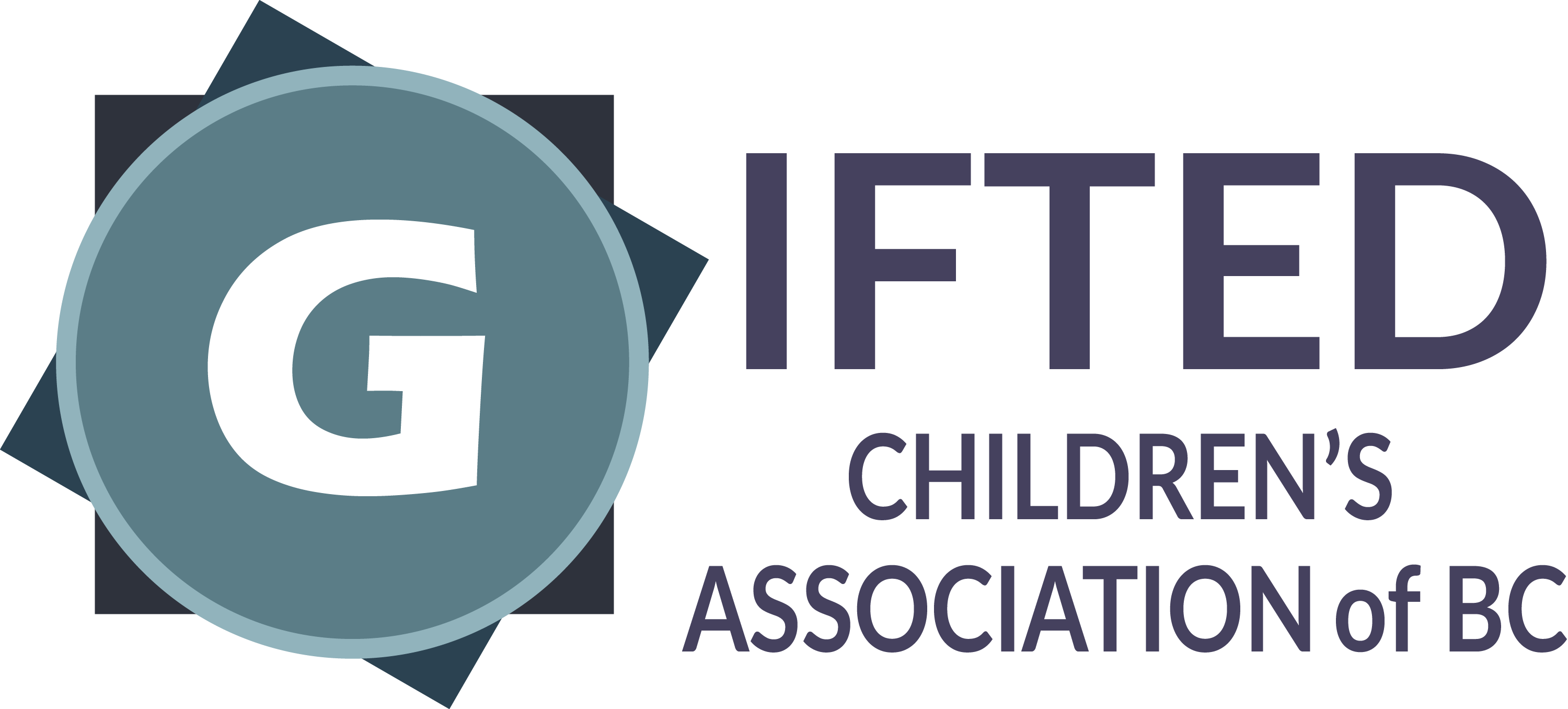Beginning to Learn About Giftedness
Please note that this section has been specifically designed for parents of gifted children in British Columbia. However, parents from other jurisdictions may also find this information useful.
Terminology in British Columbia
In understanding children with special needs who are considered “gifted”, many terms are used to describe these children. In British Columbia the terms “gifted and talented” are used to describe children who are above age-peers in at least one of their abilities. These abilities are usually assessed within the school system and are usually related to academic subjects where the student has exceptional levels of ability in one or more areas, or “gifts”. Often the word “talented” is used to refer to more artistic, creative, athletic or social abilities.
 Children can be “gifted and talented” and also have other special needs, such as learning disabilities, Attention Deficit and Hyperactivity Disorder (ADHD), etc. Children who are gifted and also have an additional special need are often called “Twice exceptional” or “2e”.
Children can be “gifted and talented” and also have other special needs, such as learning disabilities, Attention Deficit and Hyperactivity Disorder (ADHD), etc. Children who are gifted and also have an additional special need are often called “Twice exceptional” or “2e”.
Below is an introduction for those who are at the beginning of the journey of learning about giftedness. There is a great deal of additional information available through the organizations and links on our “Useful links” page, as well as through talking to parents and speakers at chapter or provincial meetings of the Gifted Children’s Association of BC (GCABC).
Definition of Giftedness
More broadly, the psychoeducational use of the term “gifted” describes a  subset of people born with distinctive, innate, neurological differences. Inherent in these differences are intellectual and talent-based capacities which score far beyond average. Quantitatively speaking, in many school districts a child is considered gifted if they are assessed with a score of 130 -160 on the widely administered Wechsler Intelligence Scale for Children. This compares to a Standard mean Score of 100 for a neurotypical person.
subset of people born with distinctive, innate, neurological differences. Inherent in these differences are intellectual and talent-based capacities which score far beyond average. Quantitatively speaking, in many school districts a child is considered gifted if they are assessed with a score of 130 -160 on the widely administered Wechsler Intelligence Scale for Children. This compares to a Standard mean Score of 100 for a neurotypical person.
British Columbia Ministry of Education definition of giftedness:
A student is considered gifted when she/he possesses demonstrated or potential abilities that give evidence of exceptionally high capability with respect to intellect, creativity, or the skills associated with specific disciplines. Students who are gifted often demonstrate outstanding abilities in more than one area. They may demonstrate extraordinary intensity of focus in their particular areas of talent or interest. However, they may also have accompanying disabilities and should not be expected to have strengths in all areas of intellectual functioning.
Information obtained from the Manual of Policies, Procedures, and Guidelines, Section E4 (2016).
Special education. (n.d). Retrieved from:
https://www2.gov.bc.ca/assets/gov/education/administration/kindergarten-to-grade-12/inclusive/special_ed_policy_manual.pdf
Theories of Giftedness
 The BC Ministry of Education suggests looking at Gardner’s “Multiple Intelligences” and Renzulli’s “Three Ring Concept”.
The BC Ministry of Education suggests looking at Gardner’s “Multiple Intelligences” and Renzulli’s “Three Ring Concept”.
Gardner’s Multiple Intelligences examines multiple forms of intelligence when understanding a child’s strengths, and these may be so strong as to be considered gifts and talents.
Joseph Renzulli’s model of giftedness involves a “Three Ring Concept” including above average intelligence, creativity and task commitment. These are each seen as an overlapping Venn diagram, and all three are seen as essential to succeed in talent development.
Parent Involvement in Gifted Education
The National Association for Gifted Children (NAGC) in the United States recommends that parents should take a proactive role in their child’s education. Generally, gifted children learn the curriculum at a faster pace than their peers, and may behave disruptively in the classroom due to boredom. It is helpful for parents to seek contact with the classroom teacher and closely investigate the classroom environment and their child’s performance. When the child is identified as gifted, the parent may contact the teacher to discuss the type of curriculum that would benefit the child. It is very important for parents to interact with the teacher as their ally. If the teacher is unable to accommodate the request, it may be possible to talk to the principal and/or the district gifted coordinator to bring change into the school.
Children who are not identified as gifted at an early age tend to lose motivation to study and problem solve. As a result, when they are faced with challenging problems they are unable to resolve them since they did not learn the problem solving skills earlier in their academic career. Hence, it is important to challenge the student in order to help them maintain and develop persistence and critical problem solving skills.
For additional reading refer to :
National association for gifted children. (n.d).
Retrieved from
http://www.nagc.org/resources-publications/resources/my-child-gifted/common-characteristics-gifted-individuals
Photo credits: Christer Gundersen, Kaku Nguyen on Pexels.com, Thgusstavo Santana on Pexels.com
